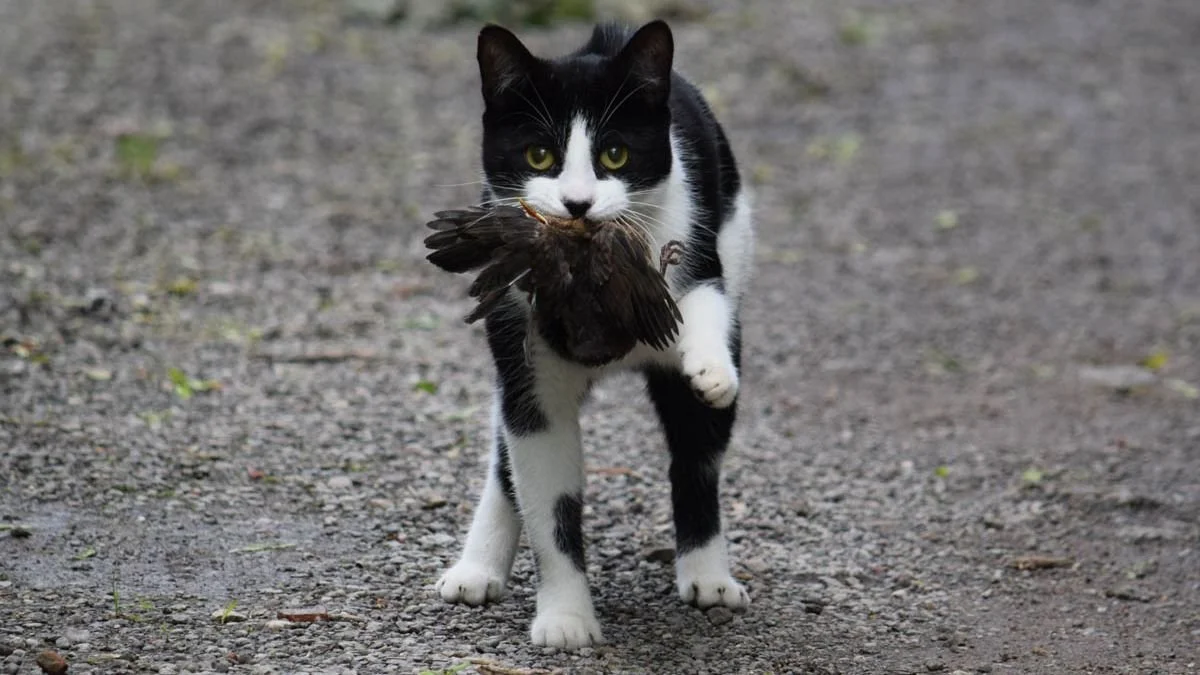Written by: Nicholas B. Canino, PHSS Intern
Cats are one of the most popular pets in the United States, with about 43 million households owning at least one. Their quirky personalities, neverending curiosity, and admirable features make them delightful pets to have. It is also common knowledge that these enthusiastic critters are not nearly as domesticated as dogs and still have a “wild side” to them. Much of their time is spent hunting toys on a string, pouncing on their owner’s hands, and gnawing on whatever they can get their paws on. Unfortunately, this can lead to a major issue for native animals on the receiving end of their wild nature.
Many cat owners think that it is essential to allow their cats to have free access to the outdoors around the neighborhood. This is due to a common misconception that cats require time outdoors in order to live a healthy life, but in reality, it has the opposite effect. But whether owners decide to leave them outside overnight, during the day, at all times, or even for short periods of time, these cats can do severe damage to the native wildlife that also calls that neighborhood home. Instead of having toys to hunt while inside, cats that are outdoors will choose to hunt a variety of native animals including lizards, birds, and small mammals. Many of these animals end up severely wounded or dead as a result of the cat's wild instincts.
Of course, cats are not to blame for simply complying with their natural behavior. In nature, these cats would be able to hunt and the populations of these animals would not decline so significantly. However, because of the increasing population of feral and outdoor cats in the United States, many native populations are not able to keep up. In some regions of the world, cat populations can be directly attributed to the extinction of numerous species. One study in 2013 found that domestic cats in the U.S. kill an average of 1.3 to 4 billion birds and 6.3 to 22.3 billion mammals annually. This unfathomable number of wildlife killed each year solely from domestic cat predation is why many wildlife ecologists believe cats are a greater concern for biodiversity than deforestation or climate change.
For a long time, cat owners have overlooked the impact that their precious pet is having on their local environment. Many owners will refute this argument by stating that they feed their cats a sufficient amount of food to stop them from hunting. But, has a cat ever stopped hunting toys on a string because it was full? Likewise, many owners say they have only seen their cat bring home an animal once or twice. But, for every animal they bring home, a few were left where they were killed and many more were severely injured and left to die. That is where Pelican Harbor Seabird Station comes in.
Over the past few years, Pelican Harbor has better tracked the circumstances of admission for many of our injured and sick animals. Since 2019, we have had nearly 500 animals come in that were attacked by a cat. About 75% of these animals were birds such as Northern Mockingbirds and Mourning Doves. The other 25% includes mammals like baby opossums and squirrels that we frequently get in the summer months. Cat attacks are the second most frequent reason why animals are brought to us for treatment. Unfortunately, the survival rate for these animals is very low with less than 50% of birds surviving to release. This is due to a potent bacteria that cats carry called Pasteurella multocida, which left untreated has a grace mortality rate. Our treatment for patients attacked by cats includes strong antibiotics to avoid infection, laser treatment for pain, and wound repair and cleaning if necessary.
Because of the high occurance of cat attacks, there is a lot that we can do at Pelican Harbor to improve the situation for our native animals. Educating guests on the consequences of leaving their cats outdoors is one of the most impactful methods we can use to reduce the negative effects of outdoor cats. We always recommend that people leave their cats indoors and only allow outside access if there is an area where wildlife cannot get to, like an enclosed patio. Not only does this ensure that our wildlife is protected, but that our cats are safe as well. While we do our part to treat our wildlife, make sure you are doing your part to protect them too!
References:
Are outdoor cats happier? - Animal Humane Society
The impact of free-ranging domestic cats on wildlife of the United States - Nature






